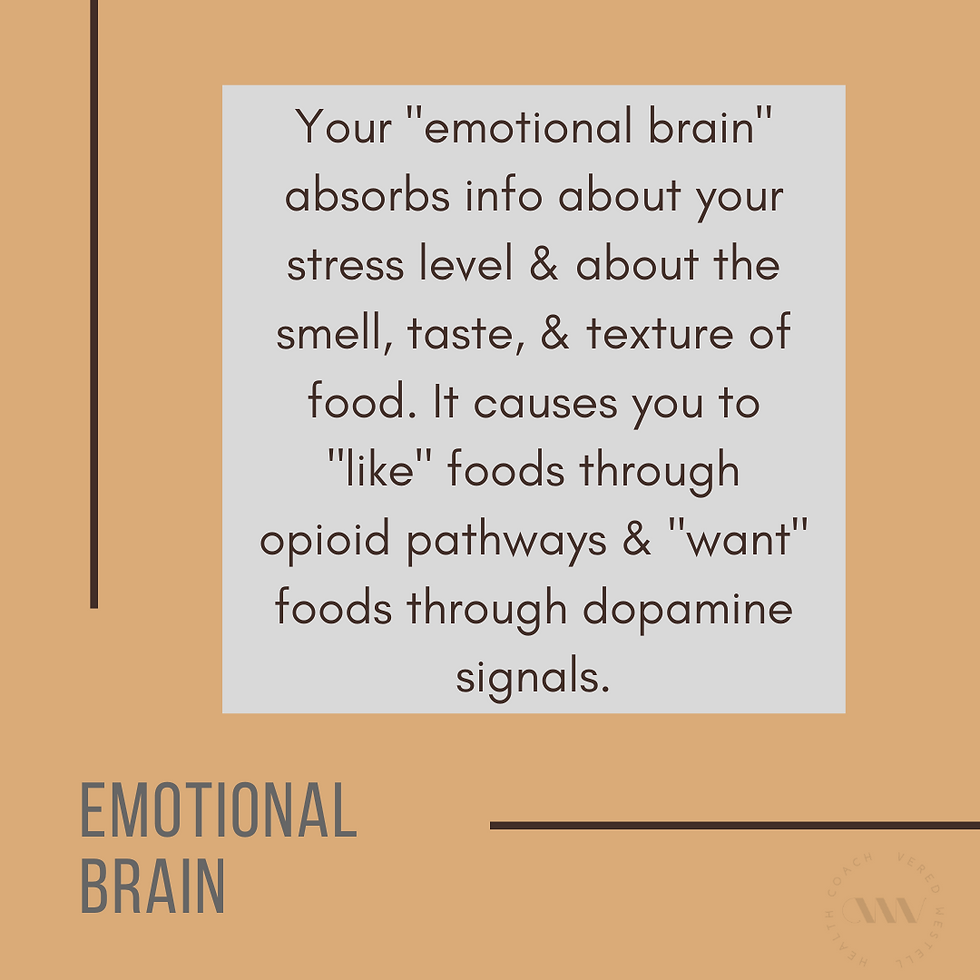
The decision to start eating, what to eat, how much and when to stop is controlled by a tightly regulated system in the brain. Our brain gets signals from our body, our stomach, digestive tract and stores of fat and translates them into action: to eat or stop eating. It coordinates these commands with our environment, so that when we are hungry we know where to get food, what types of food are available and which foods are tasty and satisfying. We can think of that coordination as being controlled by two brains working as one. We shall call them our metabolic and our emotional brains.

Integrated in a tiny part of our brain is the central command - the hypothalamus. We can think of the first brain as our metabolic brain. This brain responds to our bodies needs by communicating between our gut and our hindbrain and acts without thought, as a reflex, to the signals it receives from other parts of our body.

For example, our stomach and digestive tract have sensors that detect when our stomach is empty or stretched, and the type of nutrients that are available in our digestive tract. In other words, these receptors sense the quantity and quality of food in our gut and communicate that information via nerves and appetite hormones to the brain. In response, our hindbrain determines when we should start eating and when we are full. Pretty simple, isn’t it?
What we conceptualize as the second brain is a bit more complicated. We can think of this as our emotional and thinking brain that responds to needs beyond calories.
It helps us form memories of food: which ones we like and which ones taste bitter or rotten. It remembers which ones we ate at a particular place or time, as well as other characteristics about the food, the smell, look and texture. It also assigns an emotional value to food, so that we get pleasure and reward from certain foods.

When foods are pleasing we learn to like that food, and the brain uses the same powerful pathways that respond to narcotic drugs to communicate that information. Foods that are rewarding motivate us to want that food. This is controlled by dopamine signals, the same chemical we release from gambling and sex. The emotional satisfaction we get from food is so strong that it can override our metabolic brain, or the signals our brain receives that tell us that we are full.
Researchers speculate that our powerful drive to get such satisfaction from food was wired into our biology to motivate our ancestors to leave the safety of their caves, walk for miles, and risk encountering predators. The interaction between these two brains is complex, and in many ways, overlapping. They are Mother Nature's way of making sure our bodies fend off starvation, which was the biggest threat to our survival as the human species for most of our time on this planet. Starvation, however, is rarely a problem in our modern world, but our appetite and energy control systems aren't adapted for working to our advantage in our current food environment. That is part of the reason we are seeing such rising rates of obesity today.

Reference:
The Science of Successfully Maintaining Weight Loss, Sharon Horesh Bergquist, MD, Emory School of Medicine
Understanding Obesity, Sharon Horesh Bergquist, MD, Emory School of Medicine Mood, food, and obesity, Minati Singh, Front Psychol.2014;5: 925.
https://www.ncbi.nlm.nih.gov/pmc/articles/PMC4150387/
Neuroimaging biomarkers to associate obesity and negative emotions https://www.ncbi.nlm.nih.gov/pmc/articles/PMC5550465/

Commentaires